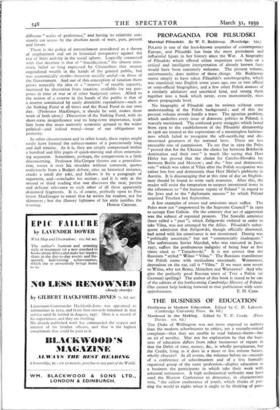PROPAGANDA FOR PILSUD SKI Marshal Pilsudski. By W. F. Reddaway.
(Routledge. Iss,) POLAND is one of the least-known countries of contemporary Europe, and Pilsudski has been the most prominent and influential figure in her history since the War. A biography of Pilsudski which offered either important new facts or a critical and intelligent interpretation of already known facts would have been extremely welcome. The present volume, unfortunately, does neither of these ,things. Mr. Reddaway seems simply to have taken Pilsudski's autobiography, which was translated into English some years ago, one or two official or semi-official biographies, and a few other Polish sources of a similarly adulatory and uncritical kind, and strung them together into a book which never, even momentarily, rises above propaganda level.
No biography of Pilsudski can be written without some understanding of the Polish background ; and of this the present volume reveals hardly a trace. The agrarian problem, which underlies every issue of domestic politics in Poland, is scarcely mentioned. The confused party struggles which lasted from 1919 to the establishment of the Pilsudski dictatorship in 1926 are treated as the expressions of a meaningless factious- ness which failed to recognise the self-sacrificing and dis- interested greatness of the national hero. There are less excusable sins of commission. To say that in 1919 the Poles " proved that for the Ukraine the choice lay between Bolshevik domination and their own " is much like saying that Herr Hitler has proved that the choice for Czecho-Slovakia lay between Berlin and Moscow ; and the " free and democratic vote " which was taken at Vilna after the Polish occupation was rather less free and democratic than Herr Hitler's plebiscite in Austria. It is discouraging that at this time of day an English- man should be found to write such nonsense. After this, the reader will resist the temptation to suspect intentional irony in the references to " the humane repute of Poland " in regard to the Jews and to the " diplomatic success " by which Poland acquired Teschen last September.
A few examples of errors and omissions must suffice. The Poles were not " empowered by the Supreme Council " in 1919 to occupy East Galicia. On the contrary that act of aggression was the subject of repeated protests. The Suwalki armistice (here called a " pact "), which Zeligowski violated in order to take Vilna, was not arranged by the Allies. Pilsudski's subse- quent admission that Zeligowski, though officially disowned, had acted with his connivance is not mentioned. Danzig was " politically uncertain," but not " commercially inadequate." The unfortunate Soviet Marshal, who was executed in June, 1937, suffers the posthumous indignity of being four or five times cited as " Tutachevski." It is not correct that the Russians " styled " Wilno " Vilna." The Russians transliterate the Polish name with meticulous exactitude. Westerners, dependent on the ear, call it " Vilna." If we must now revert to Wilno, why not Roma, Miinchen and Warszawa? And why give the perfectly good Russian town of Tver a Polish (or German) spelling? The author of this book is stated to be one of the editors of the forthcoming Cambridge History of Poland. One cannot help looking forward to that publication with some


































































 Previous page
Previous page